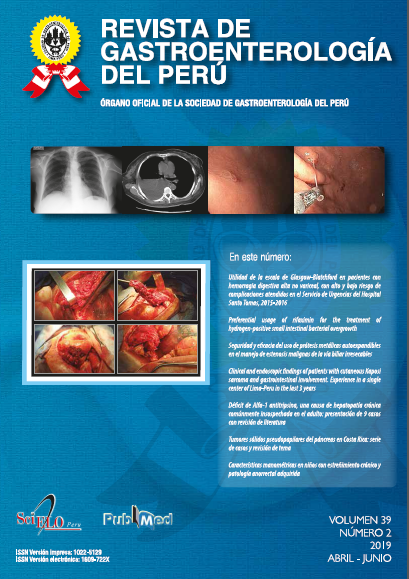Preferential usage of rifaximin for the treatment of hydrogen-positive small intestinal bacterial overgrowth
DOI:
https://doi.org/10.47892/rgp.2019.392.955Resumen
Objectives: Small intestinal bacterial overgrowth (SIBO) is challenging to treat and diagnose and is associated with diagnosis
of irritable bowel syndrome (IBS). Although no FDA-approved medications exist for treatment of SIBO, rifaximin has recently
received approval to treat diarrhea-predominant IBS and patients with methane-positive SIBO breath tests. The aim of this
study is to evaluate patient response to rifaximin for SIBO based on breath test results. Materials and methods: All patients
underwent breath testing to evaluate for SIBO during a 42-month period. Patients were defined as having a positive glucose
breath test for SIBO based on an increase of ≥ 20 ppm of hydrogen and/or ≥ 10 ppm of methane 90 minutes after ingesting
glucose. Patient demographic and symptom data, antibiotic treatment regimens, symptomatic response to therapy, and repeat
treatments were recorded. Institutional review board approval was obtained. Results: A total of 53 of 443 patients had positive
breath testing for SIBO. Response rates to rifaximin (550 mg three times daily for 14 days) were 47.4% for hydrogen positivity
alone and 80% for both hydrogen and methane positivity. Conclusions: Rifaximin was the most commonly prescribed antibiotic
regimen for SIBO therapy. Patients with hydrogen or hydrogen and methane positive breath tests responded well to rifaximin
therapy. For patients with hydrogen-positive SIBO, rifaximin may prove a highly effective therapy in providing symptom relief
from the effects of SIBO.
Descargas
Métricas
Descargas
Publicado
Cómo citar
Número
Sección
Licencia
Revista de Gastroenterología del Perú by Sociedad Peruana de Gastroenterología del Perú is licensed under a Licencia Creative Commons Atribución 4.0 Internacional..
Aquellos autores/as que tengan publicaciones con esta revista, aceptan los términos siguientes:
- Los autores/as conservarán sus derechos de autor y garantizarán a la revista el derecho de primera publicación de su obra, el cuál estará simultáneamente sujeto a la Licencia de reconocimiento de Creative Commons que permite a terceros compartir la obra siempre que se indique su autor y su primera publicación esta revista.
- Los autores/as podrán adoptar otros acuerdos de licencia no exclusiva de distribución de la versión de la obra publicada (p. ej.: depositarla en un archivo telemático institucional o publicarla en un volumen monográfico) siempre que se indique la publicación inicial en esta revista.
- Se permite y recomienda a los autores/as difundir su obra a través de Internet (p. ej.: en archivos telemáticos institucionales o en su página web) antes y durante el proceso de envío, lo cual puede producir intercambios interesantes y aumentar las citas de la obra publicada. (Véase El efecto del acceso abierto).




















 2022
2022 